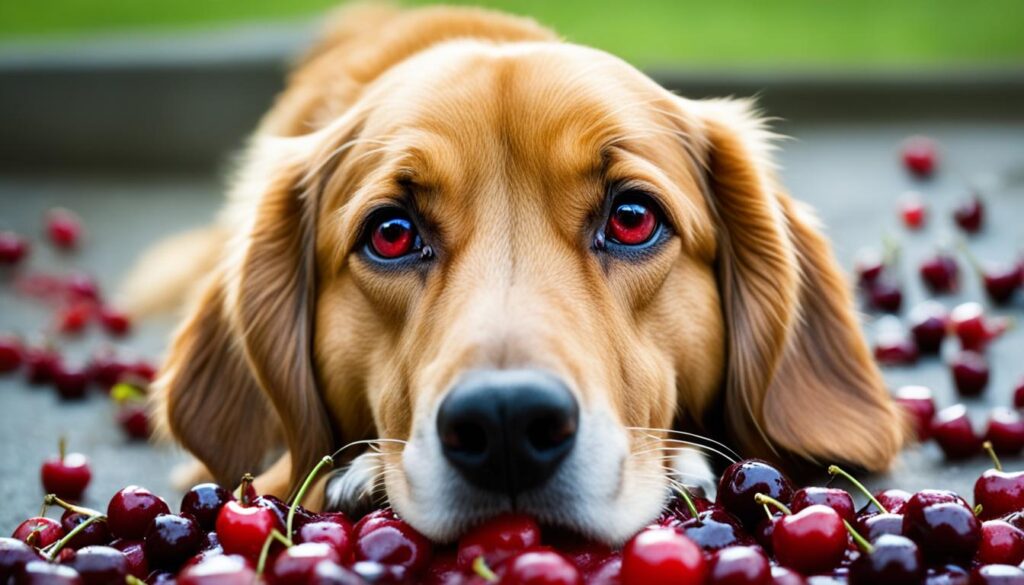As an Amazon Associate I earn from qualifying purchases.
Picture this: it’s a hot summer day, and you’re sitting under a cherry tree, indulging in the sweet, juicy goodness of cherries. As you enjoy each mouthful, your faithful four-legged companion sits by your side, watching you with hopeful eyes. A part of you wants to share this delicious treat with your furry friend, but before you do, it’s crucial to know the truth about cherries and their safety for dogs.
While cherries may seem harmless, not all parts of them are safe for our canine companions. In fact, cherries can pose a significant risk to dogs, with potentially harmful effects that could compromise their well-being. It’s essential to consider the potential dangers before reaching out to share this tempting treat with your beloved pup.
Key Takeaways:
- Not all parts of cherries are safe for dogs to consume.
- The pits, leaves, and stems contain cyanide, which is toxic to dogs.
- Ingesting cherry pits can lead to cyanide poisoning and intestinal blockage.
- Cherries can cause upset stomachs in dogs.
- It’s best to avoid feeding cherries to your dog and opt for safer alternatives.
Why Are Cherries Bad for Dogs?
So, you’ve probably heard that cherries are a delectable summer treat for humans. But what about our furry friends? Can dogs enjoy this juicy fruit too? The answer is not so straightforward. While cherries may seem harmless, they can actually be quite dangerous for our canine companions. Let’s dig deeper into why cherries are a no-no for dogs.
The primary reason cherries are considered harmful for dogs is due to the presence of cyanide in the pits, leaves, and stems. Yes, you read that right – cyanide, the toxic substance. Cyanide is toxic to dogs and can lead to serious health issues if ingested in large quantities. It can cause symptoms like difficulty breathing, rapid panting, and even seizures.
But that’s not all. The cherry pits themselves can pose a choking hazard and may even cause intestinal blockages in dogs. Imagine your pup gobbling down a cherry pit without a care in the world. Not a pretty sight, right? To avoid such risks, it’s best to steer clear of giving your furry friend any cherries.
Now, you might be thinking, “Okay, but what about the flesh of the cherry? Can my dog at least have that?” Unfortunately, even the flesh of the cherry can cause problems for dogs. While it contains beneficial nutrients like vitamins A and C, fiber, and antioxidants, it can still lead to upset stomachs in our four-legged pals. The high sugar content of cherries can also contribute to weight gain and other health issues.
Just a friendly reminder:
Cherries might be a tasty treat for us humans, but they can seriously harm our furry friends. Remember, it’s not worth the risk! Keep those cherries away from your beloved doggos.
While we’re on the subject of cherries, take a moment to appreciate this visual reminder of the dangers of cherry consumption for our furry friends:
Can Dogs Have Cherries of Any Kind?
When it comes to cherries, it’s best to leave them off your dog’s plate. While there are various types of cherries, such as bing, rainier, black, and even maraschino cherries, none of them are suitable for dogs. But why exactly?
Maraschino cherries, despite having their pits removed, are not a safe choice for your furry friend. These cherries are known for their high sugar content, which can lead to unwanted weight gain, dental issues, and even diabetes in dogs. So, keep those colorful maraschinos out of your pup’s reach!
Now, you might be wondering about canned cherries. Well, canned fruits in general are not recommended for dogs. They often contain added sugars and preservatives that can be harmful to your four-legged companion’s health. It’s always better to play it safe and avoid feeding any type of cherry to your dog.
| Type of Cherries | Safety Level for Dogs |
|---|---|
| Bing Cherries | Not safe |
| Rainier Cherries | Not safe |
| Black Cherries | Not safe |
| Maraschino Cherries | Not safe |
Remember, the health and well-being of your dog are of utmost importance. While cherries may be tempting, it’s best to find safer alternatives to satisfy your dog’s cravings.
Next, we’ll discuss what to do if your dog accidentally eats a whole cherry and the potential risks involved.
What to Do if Your Dog Eats a Whole Cherry
If your dog accidentally consumes a whole cherry, including the pit, it is not likely to cause immediate harm. However, you should monitor your dog for signs of an upset stomach or potential intestinal blockage. Symptoms such as vomiting, decreased appetite, constipation, or diarrhea may indicate an issue. It is important to contact your veterinarian for guidance, especially if your dog ingests multiple cherries or exhibits symptoms of cyanide poisoning, such as trouble breathing, red gums, or dilated pupils. Your vet will be able to provide proper guidance and treatment if necessary.
To help you understand the potential effects and necessary actions to take, here is a breakdown of what to do if your dog ingests a whole cherry:
1. Monitor Symptoms
- Watch for signs of an upset stomach, such as vomiting or diarrhea.
- Look out for changes in appetite, such as a decrease in food consumption.
- Observe your dog for any signs of constipation.
2. Contact Your Veterinarian
If your dog exhibits any concerning symptoms or if you suspect cherry poisoning, it is essential to seek veterinary advice. Prompt communication with your vet will ensure that your dog receives the necessary treatment in a timely manner.
3. Be Prepared to Share Information
When you contact your veterinarian, be prepared to provide the following information:
- The quantity of cherries ingested by your dog
- Whether the cherry pit was also consumed
- The time of ingestion
- Any observed symptoms
4. Follow Your Veterinarian’s Recommendations
Your veterinarian may advise you to monitor your dog at home or bring them in for a thorough examination. They may also recommend specific treatments to alleviate any symptoms or address potential complications. It is important to follow their guidance to promote the well-being and recovery of your furry friend.
Remember, prevention is key when it comes to keeping your dog safe from the dangers of cherry consumption. Awareness of the risks and timely action can help ensure that your furry companion stays healthy and happy!
| Symptoms of Cherry Poisoning in Dogs | Treatment for Cherry Ingestion in Dogs |
|---|---|
|
|

Are There Safer Alternatives?
While cherries may not be a suitable treat for dogs, there are plenty of other fresh fruits and berries that can safely be incorporated into their diet. Blueberries, peeled and pitted mangoes, and apples without the core and seeds are all great options for dogs. These fruits provide nutrients such as antioxidants, melatonin, vitamins A and C, and fiber without the associated risks of cherries. Alternatively, you can stick to traditional dog treats, which can be just as exciting and tasty for your furry friend.
Make Snack Time Exciting and Nutritious
When it comes to treating your pup, it’s important to choose options that are both safe and healthy. Here are some dog-friendly alternatives to cherries:
- Blueberries: These tiny powerhouses are packed with antioxidants, fiber, and vitamin C. They make for a delicious and refreshing snack for your furry friend.
- Peeled and pitted mangoes: Mangoes are not only a sweet and tangy treat, but they also contain vitamins A and C, which are great for your dog’s immune system.
- Apples without the core and seeds: Apples are a crunchy and nutritious snack for dogs. Just make sure to remove the core and seeds, as they can be choking hazards.
These safe alternatives provide a variety of flavors, textures, and nutrients that your dog will love. So next time you’re looking for a healthy snack, reach for one of these dog-approved options.

Dog Treats: The Classic Choice
“Sometimes, sticking to the classics is the best way to go. Dog treats specifically formulated for your pet’s needs can be just as exciting and tasty as fruits. Plus, they are designed to promote optimal health and nutrition, ensuring your furry friend gets the balanced diet they need. So whether you choose to indulge your dog with fresh fruits or go the traditional route with dog treats, you can’t go wrong!”
Conclusion
In conclusion, when it comes to the safety and well-being of your furry friend, it’s essential to make informed decisions about their diet. While cherries may be tempting, the potential risks associated with them, such as cyanide poisoning and intestinal blockage, make them unsuitable for dogs. It’s best to keep cherries out of their reach and opt for dog-friendly fruits like blueberries, mangoes, and apples instead.
Remember, your dog’s health should be your top priority. Always consult with your veterinarian before introducing new foods into their diet. Your vet can provide guidance specific to your dog’s needs and help you make the best choices to keep them happy and healthy in the long run.
So, next time you reach for those cherries, just remember that they are a no-go for your canine companion. Stick to the safe and delicious alternatives to give your dog a treat they’ll love without any worries!
FAQ
Can dogs safely eat cherries?
Why are cherries bad for dogs?
Can dogs have cherries of any kind?
What should I do if my dog eats a whole cherry?
Are there safer alternatives to cherries for dogs?
Source Links
- https://www.purina.com/articles/dog/feeding/can-dogs-eat/cherries
- https://www.akc.org/expert-advice/nutrition/can-dogs-have-cherries/
- https://www.petmd.com/dog/nutrition/can-dogs-eat-cherries
As an Amazon Associate I earn from qualifying purchases.

